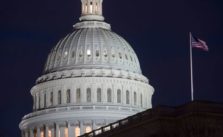Breaking News. The U.S. Senate reached a bipartisan deal Sunday to end the longest government shutdown in the nation’s history, a 40-day standoff that shuttered federal agencies, furloughed hundreds of thousands of workers, halted SNAP benefits for millions and highly disrupted air traffic throughout the United States.

Sunday night's vote was a procedurial vote that allows the bill to move forward. The deal came late Sunday after seven Senate Democrats and one Indedpendent voted with Republicans in a procedural vote to move the deal forward. Sens. Angus King (I-ME), John Fetterman (D-PA), Catherine Cortez Masto (D-NV), Jacky Rosen (D-NV), Tim Kaine (D-VA), Dick Durbin (D-IL), Maggie Hassan (D-NH) and Jeanne Shaheen (D-NH) voted in favor of the continuing resolution (CR) following the bipartisan deal.
The measure now heads to the House of Representatives, where its fate remains uncertain. House Speaker Mike Johnson (R-LA) has not said when or if the chamber will vote on the Senate package. The House has been in recess for the past seven weeks and its members must return to the nation's capital to vote.
The agreement would immediately reopen shuttered agencies through a combination of a short-term funding bill and three full-year appropriations measures. The stopgap bill would keep the rest of the government operating through late January while lawmakers continue negotiations over longer-term spending priorities.
Under the plan, federal employees would receive back pay for the weeks they went without paychecks, and departments would be barred from additional layoffs through the end of the year. Essential programs, including food assistance and veterans’ services, would resume operations within days of the president signing the measure.
The deal also postpones a decision on extending health-insurance subsidies under the Affordable Care Act. Senators agreed to hold a separate vote on that issue in December.
“This shutdown has gone on far too long. The time to act is now,” said Senate Majority Leader John Thune (R-SD), who endorsed the plan alongside a bipartisan group that included Sens. Jeanne Shaheen, (D-NH), Maggie Hassan, (D-NH), and Angus King, (I-ME). But Senate Minority Leader Chuck Schumer (D-NY), criticized the agreement, calling it “unacceptable” because it fails to guarantee immediate relief for those who lost subsidized health coverage during the shutdown.
The shutdown began Oct. 1 after Congress failed to reach a deal to fund the government. About 900,000 federal employees were furloughed or worked without pay, and key services — from airport safety inspections to food-aid distribution — were disrupted nationwide.
If approved by the House and signed by President Donald Trump, the legislation would bring a close to the 40-day impasse and restart the flow of federal funds across agencies.
More Stories Like This
Native News Weekly (August 25, 2024): D.C. BriefsMonday Morning (March 2, 2026): Articles You May Have Missed This Past Weekend
Native News Weekly (March 1, 2026): D.C. Briefs
Scope Narrowed, Report Withheld: Questions Mount Over Michigan Boarding School Study
Zuni Youth Enrichment Project Announces Family Engagement Night and Spring Break Youth Programming
Help us defend tribal sovereignty.
At Native News Online, our mission is rooted in telling the stories that strengthen sovereignty and uplift Indigenous voices — not just at year’s end, but every single day.
Because of your generosity last year, we were able to keep our reporters on the ground in tribal communities, at national gatherings and in the halls of Congress — covering the issues that matter most to Indian Country: sovereignty, culture, education, health and economic opportunity.
That support sustained us through a tough year in 2025. Now, as we look to the year ahead, we need your help right now to ensure warrior journalism remains strong — reporting that defends tribal sovereignty, amplifies Native truth, and holds power accountable.
 The stakes couldn't be higher. Your support keeps Native voices heard, Native stories told and Native sovereignty defended.
The stakes couldn't be higher. Your support keeps Native voices heard, Native stories told and Native sovereignty defended.
Stand with Warrior Journalism today.
Levi Rickert (Potawatomi), Editor & Publisher

